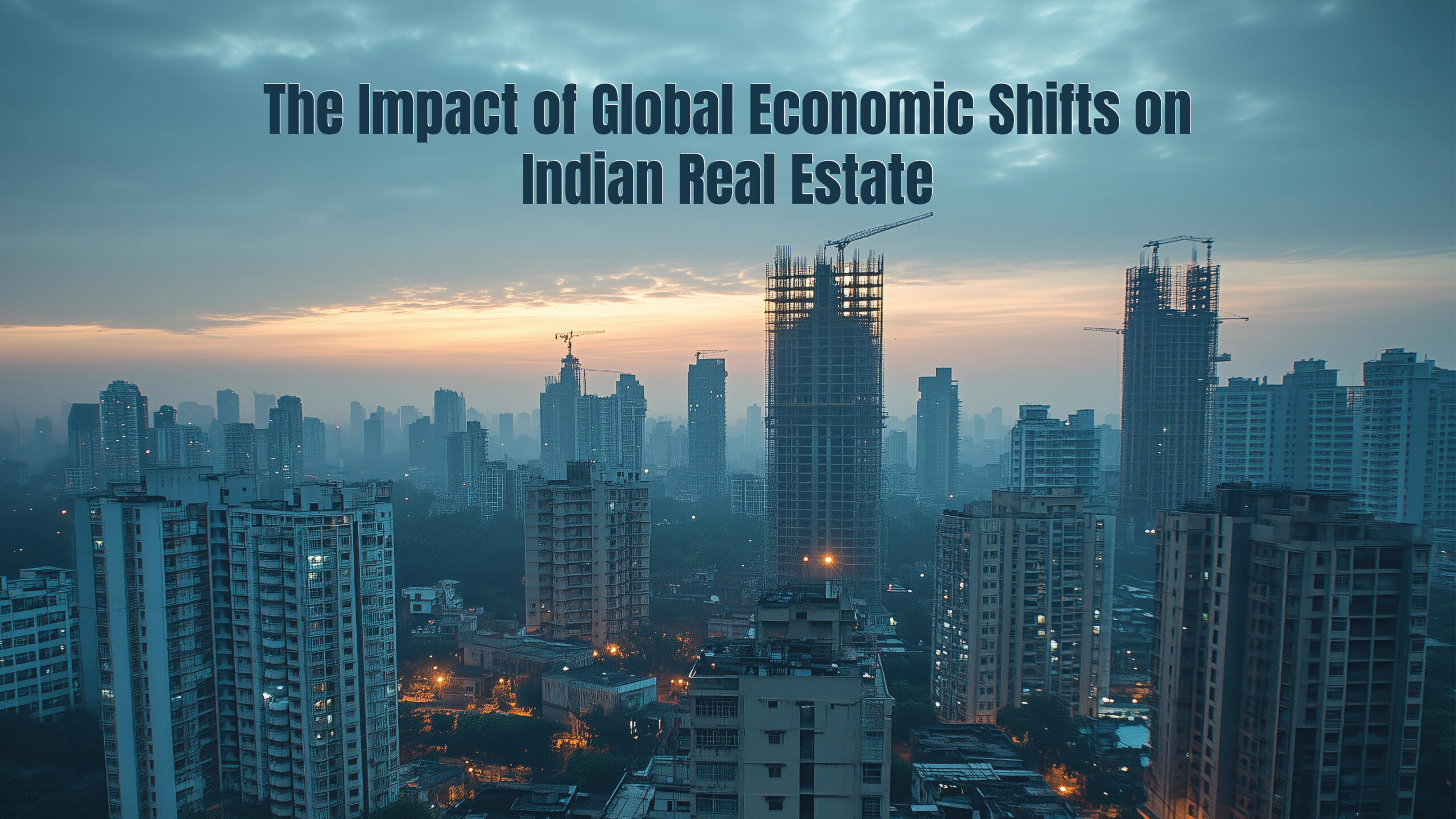Real estate is one of the most dynamic investment sectors in India, sometimes the rates fly high and other times they remain too static. Have you ever wondered why property prices fluctuate that much? While local factors such as demand, infrastructure growth and government policies play a crucial role, global economic shifts are often the hidden and unnoticed forces shaping Indian real estate market trends. These global economic shifts can be triggered by numerous factors – financial crises, inflation trends, geopolitical tensions and foreign investment flows. They influence everything from property prices to investment trends.
Once there is a thorough understanding of these macroeconomic trends, it can definitely help investors, developers and homebuyers make informed and profitable decisions before putting in the money. In this blog, we’ll explore six key scenarios in which global economic changes impact the Indian real estate market. We will dive into real-world examples, expert forecasts and strategic advice to help you navigate this evolving market.
1. Global financial crises and their ripple effect
When major economies face financial turbulence, their effects extend far beyond borders and spread globally. A perfect example that comes to mind is the 2008 global financial crisis. It was triggered by the collapse of Lehman Brothers (an American global financial services firm). The crisis had a drastic influence across economies worldwide, including India’s economy.
Let’s witness how this global crisis impacted India and its real estate.
Initially, India seemed unaffected due to its strong banking system. However, the aftershocks soon hit, leading to a slowdown in real estate investments. The phase turned into suffering for the entire market where developers struggled to secure funds, housing sales declined and commercial spaces faced reduced demand.
Now, what we learn is that resilience is the key to such scenarios. Post-crisis, India’s real estate sector adapted by focusing on affordable housing and government-backed initiatives such as the Pradhan Mantri Awas Yojana (PMAY). For investors, such crashes can even present opportunities, lower property prices and distressed assets become attractive for those looking at long-term returns.
2. Foreign direct investment (FDI) and market growth
Global investments enable the Indian real estate market to reach its maximum potential and it’s the economic stability worldwide that decides the flow of such funds. Now, talking particularly about Indian real estate’s current status, it highly attracts foreign direct investments. Global investors and multinational corporations love to put their money in the Indian market for new opportunities due to its robust economic growth and rapid urbanization.
In 2022-23, India attracted a whopping $4 billion in real estate-focused foreign direct investment, with major investments from firms in the UAE, Singapore and the U.S. This trend has significantly boosted commercial real estate, IT parks and co-living spaces.
The future landscape of Indian real estate and global investments looks solid. India’s stable economy and the support of government policies make it promising. However, exceptions are always there; a recession in the giant markets like the U.S. or Europe or a slowdown in global economies could reduce FDI in India.
Hence, it is crucial to remain updated with the latest status of international markets to predict FDI in the country better. Additionally, when global economies become stable, capital investments get paced, enabling opportunities to invest in Indian real estate, especially in the dominating markets such as Mumbai, Bangalore and Hyderabad.
3. Global inflation and interest rates
When inflation rises worldwide, central banks, including the Reserve Bank of India (RBI), respond by adjusting interest rates. Higher interest rates mean higher home loan costs, affecting affordability for buyers and slowing down the real estate market. Global inflation impacts the Indian economy directly and indirectly and the real estate sector is no exception here. When inflation rises, the central bank, the Reserve Bank of India (RBI) tackles and adjusts it by increasing interest rates to slow down rising costs and economic activities. The increase in interest rates triggers higher home loan prices, directly affecting the purchasing power of the buyers in the country.
To illustrate, lets have a look at a mini case study.
In the year 2022, the world was recovering from the pandemic and during the same year, Russia and Ukraine came into war. As an outcome, global inflation increased dramatically, making RBI to increase repo rates. The increased repo rates made home loans expensive in India, resulting in decreased property demand.
You should also know that the inflation trends in the U.S. and Europe affects the interest rate policy of the RBI more often. When such global inflation becomes stable, the RBI’s interest rates are comparatively lower, evoking buyer’s interest and demand in the real estate sector.
Ultimately, always keep an eye on the global inflation and its effect on the interest rates. When interest rates hike, get into negotiation mode for better loan offers or pick loans with flexible rates.
increased due to the weaker Indian rupee against the dollar. Tier 1 cities in India, such as Mumbai, Delhi, Pune, Chennai and Bangalore, are the prime spots for these investments.
On the other hand, a weak rupee can increase real estate development costs and selling prices. While NRIs take more interest to buy in such scenarios, domestic buyers show less interest.
Furthermore, currency fluctuations are dependent on global and domestic economic conditions. When both factors are stable, such fluctuations are less volatile, encouraging NRI investments into Indian real estate.
5. Geopolitical tensions and their effects on real estate
The geopolitical conditions, such as trade disputes and diplomatic shifts, make a surprising impact on economies and real estate markets. Again, we have to mention the ongoing Russia- Ukraine war that has led to increased property prices across the globe. Particularly talking about India, the geopolitical tension has led to high building material costs, resulting in hiked real estate prices.
Nevertheless, when such conflicts get settled, economies begin to stabilize and building material costs and property prices get back to normal, depending upon other factors as well. To be an informed and smart investor, you must follow geopolitical news and events, as they have direct and indirect effect on the market. Additionally, having knowledge of global trade relations of India and other countries will make your investing decisions more confident. Also, never miss any updates on favorable trade agreements, as they lead to a smoother supply of materials and a reduction in construction costs .
6. The rise of sustainable and smart real estate
The globe is shifting towards sustainable development and this isn’t a choice but a necessity. The real estate sector is also adapting the path of sustainable development where green buildings and smart infrastructure are at pace. In recent years, countries like the UAE and Singapore have implemented such developments really well, setting benchmarks in the category.
These kinds of shifts and standards have also influenced the Indian real estate, especially in the urban sphere. Real estate developers in the country have been more attentive towards green certifications for their projects. In addition, smart townships and energy-efficient buildings are being constructed across India. As things stand, it can be stated that India is adapting sustainable real estate models remarkably well and developers concentrating on such models will likely attract better investments.
Hence, if you are a homebuyer or investor, then investing in such green and smart projects can lead to higher returns in the future.
Conclusion
We have gone through various factors related to global economic shifts above and its needless to mention that understanding these factors becomes crucial when it comes to Indian real estate. A smart and informed investor must keep himself updated with all the news and events related to global economies.
Global financial crises, FDI, inflation, NRI investments, geopolitics and sustainable development plays a key role in determining investment flows, property prices and future trends in India.
At Arthlabh, our team performs robust research about the international and domestic real estate markets. We also keep ourselves updated with global economic shifts on behalf of our clients, making it effortless for them to make real estate investment decisions. So, if you also want to invest in real estate with confidence, then we are here to help you!



